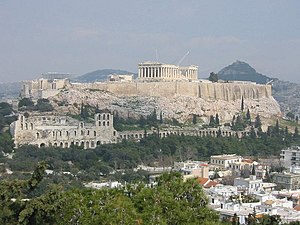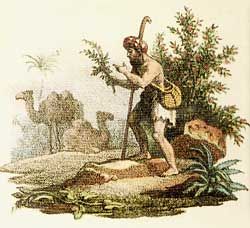 In my previous poli-philo post, I specified that because each human being is capable of a measure of rational activity, they should participate in the political process of an ideal nation. However, a citizen's participation can easily be nullified by a badly established structure of governance. Sure, we claim to strive for a democracy, but is that what the political establishment facilitating?
In my previous poli-philo post, I specified that because each human being is capable of a measure of rational activity, they should participate in the political process of an ideal nation. However, a citizen's participation can easily be nullified by a badly established structure of governance. Sure, we claim to strive for a democracy, but is that what the political establishment facilitating?Aristotle, in his Politics, describes his political establishment in terms of the polis, or rather, "city-state". The polis is comprised of a "downtown" area and the surrounding countryside. The size of the polis is large enough that the people that live in it are self-sufficient, but small enough that every citizen has a reasonable opportunity to know every other citizen. They are capable of feeding, housing, blacksmithing, clothing, and other necessities. They also may have some finer crafts and arts that they could use to trade with other poleis. Each polis would be governed independently from the other poleis, in accordance with that particular peoples' traditions and culture.
Currently, this is not how our political system in the United States appears to work today. The Founding Fathers granted all rights to the States, while giving the federal government only the power to regulate interstate commerce, provide for the national defense, and handle foreign policy. However, even today, that right is stretched to the limits in nationwide decrees on divorce, abortion, business, and in the most recent debate, healthcare. These are all decisions and laws handed down by the federal government and they apply to all states. As a result, most of the power in today's legal and judicial system is wielded by the federal government.
A possible advantage of having a strong central government is that it would make standardization laws among states easier. There is a universality among the states and their governance comes down to a singularity, the federal government. All decisions are made from D.C. and wherever you go, the laws will be uniform.
However, this returns us to my first blog post on the topic of political philosophy, concerning the viability of the philosopher-king. A singularity of power is not what a nation should be governed upon, especially in the vastly dissonant moral atmosphere of modernity. The moral health and character of this singularity will affect the governed body as a whole. If the leadership is sick, then the whole nation is sick.
In more recent times, our democracy has appeared more as an aristocracy (the term "career politicians" springs to mind). As the size of the federal government increases, the power of the federal legislature (the House of Representatives and the Senate) grows in terms of making federal laws. Political parties have been narrowed down to two groups, Republican and Democrat, and in order to receive any support from your party to win elected office, you must buy into the party's platform. Also, within the judicial system, the term "legislating from the bench" has become a popular phrase in light of many Supreme Court justices handing down decisions that essentially write laws for the whole nation.
But in recent years with the deadlock between entirely contrasting viewpoints, the President has gained legislative power. Nothing is accomplished in Congress's stalemate, so the President passes laws and declares wars without congressional approval. With the legislative branch rendered impotent, our political establishment appears more as a monarchy (or tyranny). Once more, the singularity narrows from the aristocracy (rule of the few) into an monarchy (rule of the one).
This is indeed troubling and worthy of much alarm, especially when 535 members of Congress legislate for over 311 million citizens and even worse when the President gets involved in the legislation process without Congress. So what is the solution?
The answer is to return power to smaller governing entities. Each area is aware of their governing needs, based upon their real-world experience in that area. Being at the "ground level" of a particular territory, whether it be the state or city level, will always be a more advantageous position to gauge the particular challenges of a population than a singular position in Washington DC.
In addition, the elected officials that wield the most power will be those that are of the same background and culture of the population. And a political system that establishes personal acquaintance and knowledge of the elected official is always to be encouraged in order that a citizen might be more informed when selecting those for governing duty.
In essence, this returns our nation from the folly of national political parties and encourages local groups with real concerns for their own community. Aristotle used the polis as a model for governance because it would prove large enough for self-sufficiency, the minimum for a decent living, but also small enough that it might not be encumbered by such extreme vanities and legislative singularities that currently plague our modern nation. Such global governing institutions cannot effectively and properly rule such a vast population. As a result, injustices occur and government is rendered incapable of completing the task it was designed to do: create and enforce laws, designed for the good of the people.


